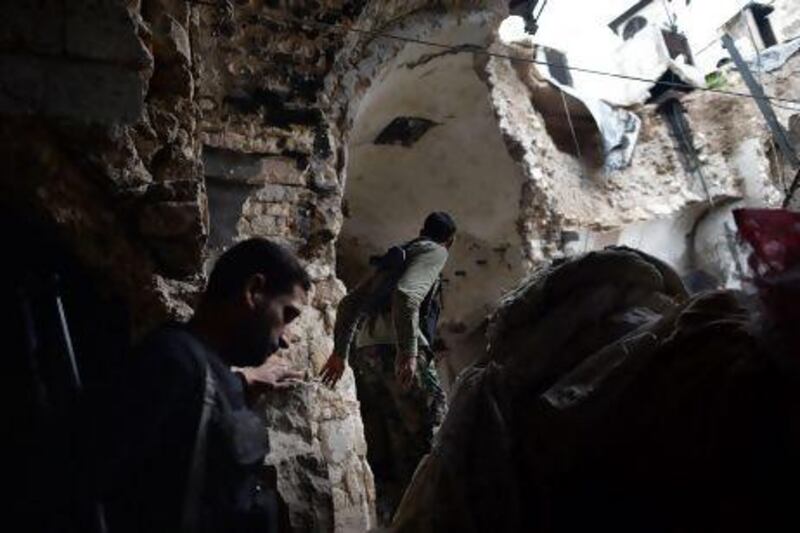DAMASCUS // Syria's president yesterday slashed prison terms by three quarters for an unspecified number of rebels convicted as "terrorists", state media reported.
The move came as as rebels and troops fought fierce battles in the country's south and north ahead of the country's independence day.
Bashar Al Assad also used a presidential decree to reduce the sentences of an unknown number of convicted criminals. Similar measures have been made during Syria's two-year-old crisis, including pardons for those convicted of acts against the state.
The opposition has dismissed such decrees as empty gestures, saying that many political prisoners and dissidents remain in Syrian jails. The government denies there is an uprising in the country and refers to rebels as terrorists carrying out a foreign conspiracy.
Syria does not disclose figures on the prisoners it holds, although its jails are believed to hold tens of thousands, including thousands of political prisoners. State TV quoted Wael Al Halqi, the prime minister, as saying that the pardon will lead to the release of about 7,000 who committed different types of crimes.
On Monday, a Syria-based human rights group said in a report that Mr Al Assad's military unit in charge of protecting Damascus is holding hundreds of suspected regime opponents in secret prisons. The claims could not be independently confirmed, but several rights groups say thousands of opposition members, protesters and their families have been detained since the revolt against started in March 2011.
Yesterday's "amnesty" is also to include those convicted of criminal acts before April 16, state TV and the official news agency said. Convicts on death row would have their sentences reduced to life imprisonment with hard labour, while those with incurable diseases or advanced aged would be pardoned. It also renewed a call for rebels to turn over their weapons, saying those who do will be pardoned.
The move came as the Britain-based Syrian Observatory for Human Rights said rebels launched an attack on the Wadi Deif and Hamidiya military bases in the north-western province of Idlib. The bases had previously been under a months-long rebel siege.
On Saturday, government forces re-opened a supply line to the area after they killed more than 20 rebels in an ambush. During the siege, the military had been forced to drop supplies in by helicopter because rebels controlled the surrounding area.
The observatory also reported clashes and shelling in other parts of the country, including in the southern town of Busra Al Harir, the cities of Aleppo and Raqqa to the north, and in the suburbs of the capital.
Meanwhile, the Syrian National Coalition, Syria's main opposition group, said Lebanon's Hizbollah group, a strong ally of Mr Al Assad, has been targeting villages near the Lebanese border for the past four weeks.
"We call upon the Lebanese government to take action against Hizbollah's aggressions and do everything within their means to ensure the safety of the innocent civilians on the Syrian Lebanese border," the SNC statement said.
Hizbollah denies its members are fighting in Syria, saying that Lebanese Shiites are defending Syrian border villages that have been inhabited by Lebanese for decades.
Turkey detained 10 people yesterday on suspicion of providing weapons and fighters in the name of Al Qaeda to Islamist rebels trying to topple the Syrian government, highlighting the dilemma Turkey faces as one of the rebel movement's biggest backers.
Turkey, which is now hosting some 400,000 Syrians who have fled the war, is one of Mr Al Assad's most outspoken critics and has given the rebels shelter and logistical support, although it denies arming them.
A camp dedicated to soldiers who have defected from the Syrian government army sits along Turkey's southern border with Syria and rebel fighters are able to cross freely back and forth across the frontier. Yet at the same time, it has no desire to let the radical groups who have joined the rebel cause, notably the Al Qaeda-linked Jabhat Al Nusra, operate on its territory or recruit Turkish citizens.
The suspects were arrested in Konya province, some 250km south of Ankara, after police were tipped off that a "radical Islamist group" was persuading young men to join the Syrian insurgents.
* Associated Press with additional reporting by Reuters





